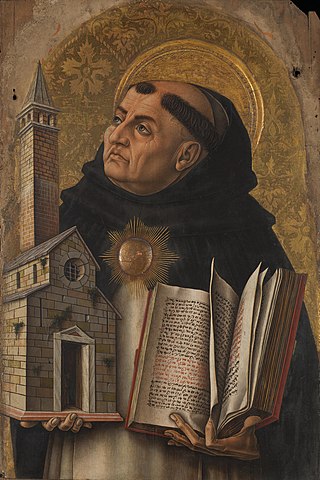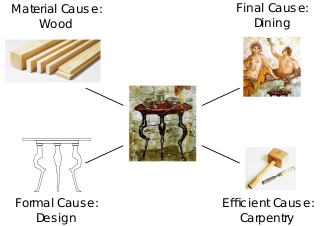Natural theology, once also termed physico-theology, is a type of theology that seeks to provide arguments for theological topics based on reason and the discoveries of science.

Omnipotence is the quality of having unlimited power. Monotheistic religions generally attribute omnipotence only to the deity of their faith. In the monotheistic religious philosophy of Abrahamic religions, omnipotence is often listed as one of a deity's characteristics, along with omniscience, omnipresence, and omnibenevolence. The presence of all these properties in a single entity has given rise to considerable theological debate, prominently including the problem of evil, the question of why such a deity would permit the existence of evil. It is accepted in philosophy and science that omnipotence can never be effectively understood.
The teleological argument is an argument for the existence of God or, more generally, that complex functionality in the natural world which looks designed is evidence of an intelligent creator.

Teleology or finality is a reason or an explanation for something which serves as a function of its end, its purpose, or its goal, as opposed to something which serves as a function of its cause.

In theology, the doctrine of divine simplicity says that God is simple. The general idea can be stated in this way: The being of God is identical to the "attributes" of God. Characteristics such as omnipresence, goodness, truth, eternity, etc., are identical to God's being, not qualities that make up that being as a collection, nor abstract entities inhering in God as in a substance; in other words, one can say that in God both essence and existence are one and the same. This is not to say that God is a simpleton or "simple" to understand. As Peter Weigel states, "Divine simplicity is central to the classical Western concept of God. Simplicity denies any physical or metaphysical composition in the divine being. This means God is the divine nature itself and has no accidents accruing to his nature. There are no real divisions or distinctions in this nature. Thus, the entirety of God is whatever is attributed to him. Divine simplicity is the hallmark of God’s utter transcendence of all else, ensuring the divine nature to be beyond the reach of ordinary categories and distinctions, or at least their ordinary application. Simplicity in this way confers a unique ontological status that many philosophers find highly peculiar." So when it comes to God's essential nature/attributes, there are no parts or accidents; this is not to be confused with, for example, God's accidental/contingent relation to the world.

Natural philosophy or philosophy of nature is the philosophical study of physics, that is, nature and the physical universe. It was dominant before the development of modern science.
The existence of God is a subject of debate in theology, philosophy of religion and popular culture. A wide variety of arguments for and against the existence of God or deities can be categorized as logical, empirical, metaphysical, subjective or scientific. In philosophical terms, the question of the existence of God or deities involves the disciplines of epistemology and ontology and the theory of value.

Thomism is the philosophical and theological school that arose as a legacy of the work and thought of Thomas Aquinas (1225–1274), the Dominican philosopher, theologian, and Doctor of the Church. In philosophy, Aquinas' disputed questions and commentaries on Aristotle are perhaps his best-known works.

The watchmaker analogy or watchmaker argument is a teleological argument which states, by way of an analogy, that a design implies a designer, especially intelligent design by an intelligent designer, i.e. a creator deity. The watchmaker analogy was given by William Paley in his 1802 book Natural Theology or Evidences of the Existence and Attributes of the Deity. The original analogy played a prominent role in natural theology and the "argument from design," where it was used to support arguments for the existence of God of the universe, in both Christianity and Deism. Prior to Paley, however, Sir Isaac Newton, René Descartes, and others from the time of the scientific revolution had each believed "that the physical laws he [each] had uncovered revealed the mechanical perfection of the workings of the universe to be akin to a watch, wherein the watchmaker is God."

The phrase "the best of all possible worlds" was coined by the German polymath and Enlightenment philosopher Gottfried Leibniz in his 1710 work Essais de Théodicée sur la bonté de Dieu, la liberté de l'homme et l'origine du mal, more commonly known simply as the Theodicy. The claim that the actual world is the best of all possible worlds is the central argument in Leibniz's theodicy, or his attempt to solve the problem of evil.

Evolutionary ethics is a field of inquiry that explores how evolutionary theory might bear on our understanding of ethics or morality. The range of issues investigated by evolutionary ethics is quite broad. Supporters of evolutionary ethics have claimed that it has important implications in the fields of descriptive ethics, normative ethics, and metaethics.

Dialogues Concerning Natural Religion is a philosophical work by the Scottish philosopher David Hume, first published in 1779. Through dialogue, three philosophers named Demea, Philo, and Cleanthes debate the nature of God's existence. Whether or not these names reference specific philosophers, ancient or otherwise, remains a topic of scholarly dispute. While all three agree that a god exists, they differ sharply in opinion on God's nature or attributes and how, or if, humankind can come to knowledge of a deity.

This glossary of philosophy is a list of definitions of terms and concepts relevant to philosophy and related disciplines, including logic, ethics, and theology.

The Quinque viæ are five logical arguments for the existence of God summarized by the 13th-century Catholic philosopher and theologian St. Thomas Aquinas in his book Summa Theologica. Five ways of St. Thomas Aquinas for the existence of God managed to prove the existence of God through nature. They are:
- the argument from "first mover";
- the argument from universal causation;
- the argument from contingency;
- the argument from degree;
- the argument from final cause or ends.

The four causes or four explanations are, in Aristotelian thought, four fundamental types of answer to the question "why?", in analysis of change or movement in nature: the material, the formal, the efficient, and the final. Aristotle wrote that "we do not have knowledge of a thing until we have grasped its why, that is to say, its cause." While there are cases in which classifying a "cause" is difficult, or in which "causes" might merge, Aristotle held that his four "causes" provided an analytical scheme of general applicability.
In philosophy, a theory of everything (ToE) is an ultimate, all-encompassing explanation or description of nature or reality. Adopting the term from physics, where the search for a theory of everything is ongoing, philosophers have discussed the viability of the concept and analyzed its properties and implications. Among the questions to be addressed by a philosophical theory of everything are: "Why is reality understandable?" – "Why are the laws of nature as they are?" – "Why is there anything at all?"
The evolutionary argument against naturalism (EAAN) is a philosophical argument asserting a problem with believing both evolution and philosophical naturalism simultaneously. The argument was first proposed by Alvin Plantinga in 1993 and "raises issues of interest to epistemologists, philosophers of mind, evolutionary biologists, and philosophers of religion". The EAAN argues that the combined belief in both evolutionary theory and naturalism is epistemically self-defeating. The argument for this is that if both evolution and naturalism are true, then the probability of having reliable cognitive faculties is low. This argument comes as an expansion of the argument from reason, although the two are separate philosophical arguments.
The argument from degrees, also known as the degrees of perfection argument or the henological argument is an argument for the existence of God first proposed by mediaeval Roman Catholic theologian Thomas Aquinas as one of the five ways to philosophically argue in favour of God's existence in his Summa Theologica. It is based on ontological and theological notions of perfection. Contemporary Thomist scholars are often in disagreement on the metaphysical justification for this proof. According to Edward Feser, the metaphysics involved in the argument has more to do with Aristotle than Plato; hence, while the argument presupposes realism about universals and abstract objects, it would be more accurate to say Aquinas is thinking of Aristotelian realism and not Platonic realism per se.
An ontological argument is a philosophical argument, made from an ontological basis, that is advanced in support of the existence of God. Such arguments tend to refer to the state of being or existing. More specifically, ontological arguments are commonly conceived a priori in regard to the organization of the universe, whereby, if such organizational structure is true, God must exist.

In philosophy, naturalism is the idea or belief that only natural laws and forces operate in the universe.












